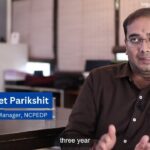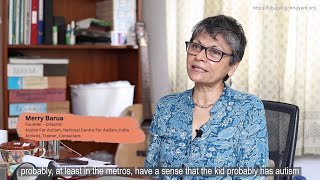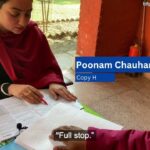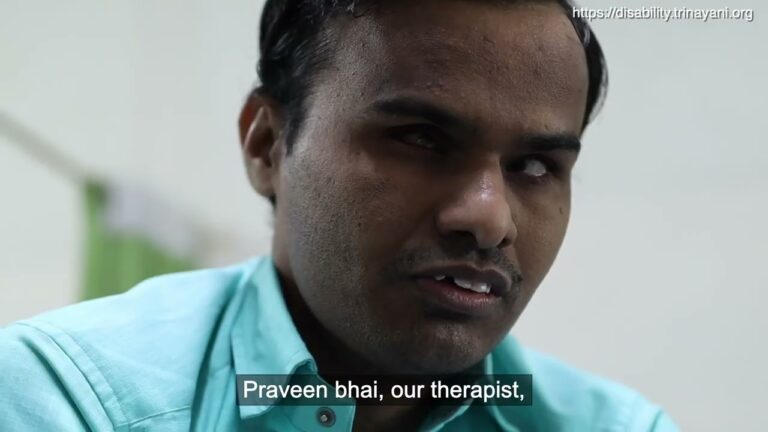Special Olympics Bharat – all you need to know
Over 1.5 million individuals with intellectual disabilities and developmental delays are registered with Special Olympics Bharat. This transformative sports program extends its impact beyond athletes to families, coaches, and entire communities!
Watch this film to see how, including and beyond sports, Special Olympics Bharat offers initiatives like the Young Athletes Program, health screenings and empowers athletes to assume leadership roles. As Indian athletes prepare for the 2025 World Winter Games in Italy, they continue the legacy of excellence and inclusion through Special Olympics Bharat.
This film aims to bring together more people to connect, support, and empower people with disabilities, using sports as a powerful medium for change.
Over 15 lakh persons with intellectual disability and developmental delays are registered currently with Special Olympics Bharat and that doesn’t mean that the impact is restricted to just them.
The impact of the sports program which Special Olympics Bharat is essentially, it reaches out to the family members, to the coaches, to the community which surrounds and which stays along with the athlete.
The impact percolates, it spreads across the communities and that is how Special Olympics Bharat has brought about the sports program for building communities of acceptance.
*
The Special Olympics through sports, transforms entire lives of the participants.
People with intellectual disabilities of any age group, whether adults or children, can participate in it.
*
Special Olympics Bharat is a sports program for people with intellectual disabilities and developmental delays.
And it is recognized by the na…by the Government of India, the Ministry of Youth Affairs and Sports as a National Sports Federation and is accredited by Special Olympics International, USA as, to conduct their programs all over India.
And just like the Olympics, Special Olympics World Games happen every other year, once every two years and they alternate between World Winter and World Summer Games.
Now how do we reach out from the headquarters which is in the US to the grassroots level?
We have a structure where every state and union territory of India has a committee of its own.
They have their own state chapter and through that, we managed to percolate and reach this program, reach out to the grassroot level, right through the various districts and through the local levels.
So, the athlete is identified, trained and uh provided an opportunity of competitions right through those levels until the athlete reaches a level where he or she can represent India on the international platform.
*
It starts at a smaller level, like the school level.
First, we identify the schools and register the children.
Then, we start training them to move on to the district level and after more training, they reach the state level.
We conduct State Championships in different states, they compete and from there get selected for the National Games.
After winning the National Championship, they arrive at 3 to 4 preparatory camps.
*
So, every state, every state chapter has a network of special schools and mainstream schools.
They reach out, in fact they reach out to various sports clubs, academies, special schools, mainstream schools, so that’s where they get their athletes from, that’s where the athlete population come from.
Where the training happens is, again it depends on the state chapter, we essentially have it in schools and colleges, many very times.
Like I will tell you, even the preparatory camps that we had for the world games, were held in the Amity University, were held in the Manavrachna University.
So, universities and schools and colleges are really really very supportive and are very meaningful and valued partners.
And that brings me to the greatest news of the year, that we went to Berlin.
We had the Special Olympics World Summer Games, which were held in Berlin, in Germany, in June of this year, of 2023.
So, there were 198 athletes and unified partners who represented India.
Representation was essentially from 23 states and they uh went and participated in 16 out of 26 sports that featured the World Games over there in Berlin.
And we won 202 medals through athletes with intellectual disabilities and this brings us to the urgency of including them in the mainstream of the society.
*
I would like to say that parents have a huge role to play here.
There is still a need for awareness about the Special Olympics, and people are getting aware these days of what the Special Olympics can do, so parents themselves bring their children to us to compete, which is a great thing.
Our main aim is to reach everyone and tell them that there is no need to hide people with disabilities, we aim to bring them out in this world.
It is not essential that everyone could read or write, but if we could bring people with disabilities into sports, through sports we change them and their lives a lot.
*
Uh Special Olympics has a program, while sports is the mainstay, training sports, training the coaches to get sensitized to people with intellectual disabilities and also giving ample opportunities for people with intellectual disabilities to compete in various sports.
We conduct 26 sports in India and when we say winter sports, we mean snowboarding, snowshoeing, perhaps some of the sports that we haven’t even heard of, which are not very common in India.
But yes, there are our athletes with intellectual disabilities who train in that and who represent India and who have represented India in these sports so far.
In fact, we’ve been participating in the World Games since 1987.
And so far, over around 1250 athletes have represented India and they have brought over 1500 medals.
Um yeah and as I was saying sports being the mainstay, we also have certain additional initiatives.
These additional initiatives aim to overall develop the personality of a person with an intellectual disability.
Uh that includes a young athlete’s program, which is actually, which, where the target uh group is athletes between the ages 2 and 8.
Now this looks into uh the flexibility, mobility and those aspects which prepare them for the sports competitions and all.
And it is a very colorful program and there’s a lot of…you can feel the environment is very joyful, people are having fun and they are training and there is a lot of learning and development happening on the side as well.
*
There are many such examples where these children were not able to interact with anyone but after joining the Special Olympics, let alone interaction, now they play sports and make new friends as well, and at a level where they compete at the World Summer Games and World Winter Games.
They stay without their parents for 15 days or so, and win medals.
If you meet them now, you will not be able to believe that they are the same children, the same athletes who weren’t so independently interactive before.
*
So apart from young athletes we have initiatives where we, you know, kind of look into the health parameters of the athletes.
We very regularly conduct their screenings and especially when there is an event coming up like the World Games.
And they are screened across seven disciplines and even at the World Games we had the screenings of all the athletes who had participated in the World Games which is close to around 7,000 of them.
Uh then we have initiatives like an Athlete Development Program.
That focuses specifically on the athletes, it’s uh, it trains them to assume higher roles.
So here the coaches play a very important part because as they are training the athletes in sports, they also are able to identify those who show a potential to assume higher roles.
And the specialized athlete development course looks into further development as in how they can be trained to uh, you know, in in roles like governance, in roles like public speaking, also to develop as coach assistants because when they start assisting their coaches then they become a very very meaningful and very effective and successful bridge between the coach and the other athletes who he or she has played with in the past.
*
And after all this when parents see their kids, their point of view changes.
People who didn’t want to send their children to the Special Olympics or send them out in the world, now want to send their children out and want them to play and do something and show it to the world.
And this is not just for the medals but for the dignity and confidence that they gain through this.
The medals are secondary.
The Special Olympics has the motto that ‘let me win but if I cannot win, let me be brave in the attempt’.
*
There are some very three prominent verticals around which Special Olympics, which is a global inclusion movement, tries to or aims to bring about inclusion that’s sports, that’s health and that’s the huge program with youth and schools and colleges uh and also the leadership development.
So, when, when we talk of sports there is the training of athletes as well as upgradation of the coaches.
When we talk of health, we train the medical community.
Uh they are experts in their fields but we sensitize them towards engaging or examining athletes with intellectual disabilities, and just to make them comfortable, to, you know, look after this population.
We also, while we train these experts we call them Clinical Directors, a term which is coined by Special Olympics and they are just made comfortable and we just make an effort jointly to ensure that the benefits of development in the health sector reaches the athletes or people with intellectual disabilities as well.
So, the competitions for a child to uh compete actually is above eight, but we try, in most of the cases and very practically, the athletes who go in for competitions are easily over the age of 12, 13, 15 like that.
So, like, currently, our athletes are preparing for the World Winter Games, which is the Special Olympics World Winter Games, which are going to happen in Italy in, in the year 2025.
And the sports that they are preparing for are Alpine Skiing, uh Snowboarding, Snowshoeing, Floor hockey, floorball, Figure skating and Speed skating.
So these are the sports that we are going to participate in at the Italy World Winter Games.
*
The Special Olympics has participants from everywhere – be it from a village, a city, someone rich, or poor – we see people from different status and levels here.
Some athletes have parents who are drivers, say, the father is a driver and their mother is a maid.
Their children are getting out, taking a flight for the first time, getting out of their village for the first time…going to Delhi must have been a huge deal for them, but they went to Berlin too.
They went to another country, they played there and won!
There were approximately 190 countries who participated, so when they compete and win and after returning they get the support from our government in the form of the cash prize award, just like any other Olympic, Commonwealth or Asian Games winner, this acts as a huge motivation for parents from humble backgrounds.
The children who they thought of were good for nothing, who cannot do anything, when they participate in the Special Olympics and win, it’s a proud moment for them that they have won a medal.
When the media covers them and they are welcomed like any other player, with huge pomp and applaud, and they receive the cash prize.
*
Special Olympics World Games is the greatest way of showing to the world that differences are celebrated, differences are there not to close your minds but to break mindsets.
*
According to me, awareness is the biggest thing.
People need to be aware.
All I want to say is, accept the children with disabilities, do not underestimate them or pity them.
Think of them as your equals and support them along the way ahead.
The empowerment of the intellectually disabled kids, and the medals they win, their media coverage, and the praise they get from the masses – I want more people to be connected to this.
Using the medium of sports, we need to make more people aware and connect and involve with them.
athlete development, coaching, community acceptance, developmental delays, disability awareness, disability confidence, disability inclusion, disability rights, health screenings, inclusive sports, independent living, intellectual disability, international competition, leadership development, medal winners, Paralympic games, social integration, special education, Special Olympics Bharat, sports training, youth empowerment


















